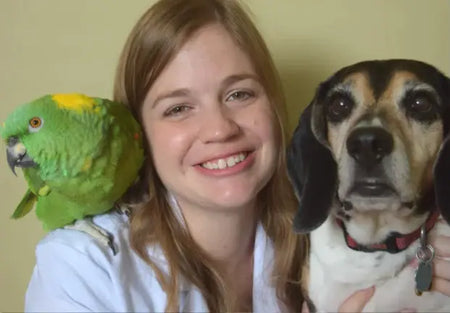In This Article
We have all been there – your dog begging under the table giving you those big irresistible eyes or perhaps your cat hopping up next to your plate to inspect what options they may want to try. It can be so hard to deny them a taste of what you are having. After all, they enjoy it and we take pleasure in giving them that experience. Sometimes it is even a form of bonding with them. However, while enjoyable in that moment, too much table food can harm your pet’s health.

Weight Gain
The daily caloric requirements for our pets are lower than what they are for us. While small table scraps from our plates may not seem like much, they can add up very quickly calorically for our pets. A small piece here and there likely won’t cause too much of an issue, however, it can create a habit that over time adds up and leads to weight gain. Older pets and pets with a less active lifestyle are more susceptible to weight gain. With any treat, table food or formulated pet treats, moderation is always key!
Harmful Foods
Our diets consist of a wide variety of food options, so it can be difficult to remember that some of the foods we eat are toxic to our pets. Savory dishes enriched in onions and garlic should be avoided as these foods in large amounts can cause anemia and gastrointestinal upset. Grapes and their counterparts, raisins, can cause kidney damage.
Macadamia nuts can cause some generalized weakness and tremors. Avoid fruit pits as some of these contain toxic substances. Chocolate, candy, caffeine, and alcohol are other potential toxins to dogs and cats. When thinking about toxins, the severity of clinical signs is really dependent on the dose/quantity fed (purinainstitute, 2022).
If you are unsure of what foods may pose an issue with your pet, ask your veterinarian or check out the ASPCA poison control website (purinainstitute, 2022).
Heath Problems
You may have a dog with a stomach of steel that can garbage dive or counter surf, no problem. But perhaps you have a dog that is so sensitive, one new treat disrupts his or her gastrointestinal tract for days. Feeding table food is a sure way to potentially cause some gastrointestinal upset which may require medical intervention. In milder cases, clinically we may see an animal with vomiting and/or diarrhea who is otherwise eating, drinking, and acting normally.
While in other cases it may be more severe resulting in lethargy, dehydration, and abdominal pain. In cases of more complicated clinical signs, medical conditions such as pancreatitis, which is inflammation of the pancreas, may be present and require hospitalization. High-fat meals and genetic predispositions can contribute to the development of this disease. So next time you think of sharing those french fries and hamburgers, think twice to help avoid future health issues.
Picky Behavior and Bad Habits
Feeding table foods, especially a diet of only table foods, can lead to animals developing pickier behavior when eating. This can cause challenges should you ever discontinue these table foods or need to transition them to a kibble-only diet. Feeding table scraps directly from your plate can also lead to undesired begging habits which can be challenging to correct.
The good news is, while table food is generally not recommended, we can still spice up our pet’s diet on a daily basis and make them feel included in mealtime. Consider offering healthy options such as blueberries, carrots, unsalted canned green beans, apple slices, etc. If you insist on giving them to your pet while at the dinner table, set them aside on a special plate. These are healthy options that can be offered throughout the day as well and often, your pet won’t recognize the difference between that big juicy steak and some mixed veggies/fruits, but they will feel included at mealtime. These will not only help prevent medical issues as mentioned above but will also support their overall health.
Sources
- Purina institute. (2022, November 4). Toxic Foods for Dogs and Cats. Nestlé Purina Petcare Company. https://www.purinainstitute.com/centresquare/understanding-pet-food/toxic-food-for-dogs-and-cats


